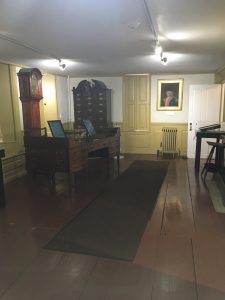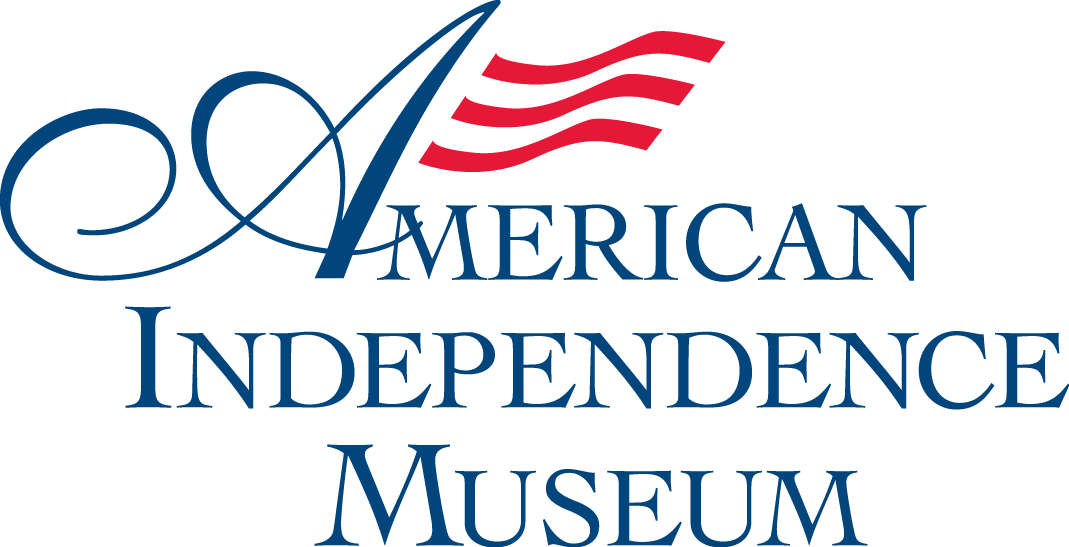by emma | Aug 21, 2018 | Exhibits
the American Independence Museum hosted its latest Lunch & Learn, entitled “Global Perspectives on the Revolution: The Exhibit Up-Close,” which took visitors on a global journey.
“The American Revolution was not just an isolated event in North America,” said Rachel Passannante, collections and visitor services manager. “It had worldwide implications.”
Presented in partnership with People’s United Bank as is the entire lecture series, the Lunch & Learn reflected the museum’s 2018 theme, termed “Global Perspectives on the Revolutionary War.” During this latest lecture, visitors had the opportunity to view this year’s special exhibit in the Ladd-Gilman House.
In conducting much of the research behind the exhibit, Passannante said she was excited to learn more about “the tangled web” of nations that took an interest in the Revolution. Some of these nations included France, Holy Roman Empire of the German Nation, Denmark, Spain and Russia. Even what is known as the Netherlands had a vested interest in the war.
“The Dutch were one of the few visible supporters of America’s fight for independence,” she said. “Known as the United Provinces at the time, they were the first to recognize America as a nation in 1776. They openly traded with America and sent thousands of ships carrying a variety of goods from their trading post on St. Eustatius in the West Indies.”
In helping frame the Revolution and its entire collection with a global context, Executive Director Emma Bray said the museum is able to demonstrate history’s relevance to discussions today.
“There is a context for everything we do as people and a nation,” she said. “Many of today’s themes–political or trade, for instance–have their roots in history that extend well beyond colonial history into Greece and further back than that…If we can better understand history, we can better understand ourselves today.”
The museum’s Lecture Series, which includes evening Tavern Talks and afternoon Lunch & Learns, is presented in partnership with People’s United Bank. Tavern Talks are additionally supported by a Humanities-To-Go grant from the NH Humanities Council.
The series is held in Folsom Tavern, 164 Water Street, Exeter, NH and is free and open to the public.
Founded in 1991, the American Independence Museum welcomes more than 5,500 visitors annually and distinguishes itself with educational school programs and events that make history fun and relevant.
![Museum receives $10,000 grant award]()
by emma | Aug 21, 2018 | Grants
Educating visitors of all ages is one of the most important objectives at the American Independence Museum and one that recently received a major boost with a $10,000 grant from the Fullwood Foundation.
The grant award will enable the museum to purchase and incorporate mechanical physical interactives into three of its eight exhibit rooms. Part of the funds may also be used to purchase tactile, hands-on reproduction objects.

According to museum Executive Director Emma Bray, the grant provides an opportunity for the museum to follow in the footsteps of similarly focused cultural institutions.
“Hands-on learning is not a catch-phrase,” she explained. “It’s how kids and many adults learn best, and we need to build spaces in our museum to allow for that. We are so thankful that the Fullwood Foundation shares our vision and has made such a critically important investment at such a perfect time for us.”
Bray said now is a particularly important time, because the museum is in the middle of a 5-year strategic plan with a focus on elevating its program offerings and enter new educational areas.
“The museum has a role in promoting 21st Century Learning Skills,” she said. “We can be relevant in today’s world, but we need the right tools. This grant puts them right in our hands.”
The timeline for the grant is approximately 9 months, which coincides with the museum’s opening for the 2019 season. Expressing excitement at the grant’s potential to affect its education objectives, Bray said there is also “a global theme” at play.
“We want to serve as a hub for downtown Exeter where people can gather, relax and feel at home here,” she said. “The more we can transform both the space inside our walls and outside them, the better it is for the profile of this vibrant town.”
She cited collaborations as instrumental to this vision.
“We do not work alone, which makes the partnerships we have with grant funders, corporate partners and individual donors so important,” she said. “We hope others will see Fullwood Foundation’s support of our operations and also want to invest in our mission to preserve our shared colonial history.”
Founded in 1991, the American Independence Museum welcomes more than 5,500 visitors annually and distinguishes itself with educational school programs and events that make history fun and relevant.
by emma | Aug 16, 2018 | Uncategorized
With school nearly back in session, the American Independence Museum is busying itself for visits with school groups from across the state. Available programs are geared toward students from K- 12, and several spots are still available.
“Our school programs are great because they bring students into an environment that makes history seem very real,” said Abigail Pietrantonio, education manager. “They can see where some of the leaders of Exeter lived during the Revolution and sit in a room that once welcomed George Washington. This is a perfect setting for hands-on learning.”
2018 -2019 school year programs include Letters to a Young Nation (grades K-2), Roots of Revolution – Patriot or Loyalist? (grades 5+), Students as Tour Guides (grades 8-12), and Colonial Living Days (grades 1-12).
The cost for these programs are per student and vary between $5 and $8. All programs are between 60 and 90 minutes long and accommodate a maximum of 50 participants.
“We want to be a resource for teachers and schools,” said Pietrantonio. “Our programming can be customized to complement what is taught in the classroom with the added bonus of being in an 18th century environment.”
Home to a world-class collection of 3,000 historic artifacts, the museum welcomes more than 5,000 visitors annually and distinguishes itself with educational school programs and events that make history fun and relevant.
To book a school group, or learn more about the American Independence Museum, visit www.independencemuseum.org. Pietrantonio may be reached at [email protected].
by emma | Aug 9, 2018 | Events
Although in a town as historic as Exeter (375+ years old), it is impossible to cover its entire history in one event, the American Independence Museum is trying to provide folks with a peek “behind the scenes.”
On Friday, August 24, the museum will host the third of four Architectural Tours this season. It will provide visitors with the opportunity to see areas of both 18th century buildings on the property that are not typically open to the public.
Among many interesting historical footnotes, the ca. 1721 Ladd-Gilman House was home to NH’s first Governor, John Taylor Gilman, who served in such capacity off and on for 14 years from 1794 to 1816. In 1985, a Dunlap Broadside, the first official printing of the Declaration of Independence, was re-discovered in its attic.
“The Ladd-Gilman House has been home to many interesting characters and events through the years,” noted museum Executive Director Emma Bray.
Originally built in the center of downtown Exeter where Me & Ollies exists today, the ca. 1775 Folsom Tavern is now “down the hill” from the Ladd-Gilman House and boasts a unique history of its own. In addition to where the New Hampshire Chapter of the Society of the Cincinnati was founded in 1783, Folsom Tavern welcomed George Washington in 1789 where he “partook in a collation” served by the Folsom family.
“The Society still owns our properties, so this tie to history is still evident today,” added Bray. “Folsom Tavern was undoubtedly a gathering spot for many, including politicians and soldiers, during the Revolution.”
During the Architectural Tour, visitors will learn how the two buildings have changed through the years, their decorative styles and architectural features. The tour takes place at 10:30 am on Friday, August 24.
Due to the historic nature of both buildings, they are not handicap accessible. Tickets are $10 for non-members and $5 for members.
Home to a world-class collection of 3,000 historic artifacts, the museum welcomes more than 5,000 visitors annually and distinguishes itself with educational school programs and events that make history fun and relevant.
by emma | Aug 8, 2018 | Events, Partnerships
Located next to each other in downtown Exeter, the American Independence Museum and People’s United Bank are more than simply neighbors, but partners as they present the next Lunch & Learn on Wednesday, August 15.
Entitled, “Global Perspectives on the Revolution: The Exhibit Up-Close,” the presentation will be facilitated by the museum’s Collections Manager, Rachel Passannante, who will discuss their “global theme” and 2018 special exhibit.
“So much of our programming relates to our theme, Global Perspectives on the Revolution, which helps frame the importance the war had on other nations,” she said. “Our special exhibit this year tells that story, so I look forward to talking to people about it and then taking them on a tour of the museum to show it to them.”
For the past two years, People’s United Bank has helped present the museum’s evening talks with an expansion in 2018 to include the Lunch & Learn series, which takes place at noon at Folsom Tavern.
“Education is so important to us, and we love the museum’s focus on engaging the community,” said Marc Ouellette, vice president, senior market manager at People’s United Bank. “We are proud to partner with them to bring these talks and discussions to the community at no charge.”
Tavern Talks are additionally supported by a Humanities-To-Go grant from the NH Humanities Council.
Lunch & Learns are held in Folsom Tavern, 164 Water Street, Exeter, NH and are free and open to the public, who are welcome to bring lunch to eat during the presentation.

